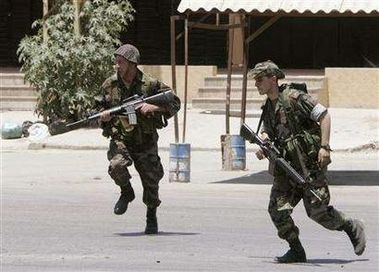 BEIRUT, Lebanon (CNN) — Lebanon’s economy minister on Monday asked for money and resources to help Lebanese forces battling members of an Islamic militant group in a Palestinian refugee camp near Tripoli. "I take this opportunity to ask our friends all over the world — Arab governments and friendly Western governments — to help us both logistically and with military equipment," Minister Sami Haddad told CNN.
BEIRUT, Lebanon (CNN) — Lebanon’s economy minister on Monday asked for money and resources to help Lebanese forces battling members of an Islamic militant group in a Palestinian refugee camp near Tripoli. "I take this opportunity to ask our friends all over the world — Arab governments and friendly Western governments — to help us both logistically and with military equipment," Minister Sami Haddad told CNN.
The militant group Fatah al-Islam, he said, is well-financed and heavily armed, but the army’s morale is high, and the government has public opinion on its side. "We can hold out, but the help I’m requesting will be very important in speeding up our eventual victory," he said. Haddad said "it’s no secret" that the Lebanese army could be in a better position to do battle, but he insisted Lebanese forces would ultimately win their fight at the Nahr al bared refugee camp.Militants from Fatah al-Islam began shooting at the forces, who returned fire, triggering clashes in the vicinity of the camp. Fighting continued into Monday, and according to Lebanese officials, at least 15 militants and 30 Lebanese soldiers were dead, and dozens more wounded.
President Bush on Monday expressed support for Lebanon’s democratically-elected government and its efforts to shut out the militant group. "Extremists that are trying to topple that young democracy need to be reined in. Certainly we abhor the violence where innocents die. And it’s a sad state of affairs when you’ve got this young democracy in Lebanon being pressured by outside forces," Bush told Reuters in an interview aboard Air Force One.
Bush, who has previously criticized Syria’s influence in Lebanon, stopped short of saying they were involved in the current violence.I don’t know about this particular incident. I’ll be guarded on making accusations until I get better information, but I will tell you there’s no doubt that Syria was deeply involved in Lebanon. There’s no question they’re still involved in Lebanon," he told Reuters.Syria denies instigating the violence in Lebanon.
Violence severely limits access to aid
Meanwhile, despite being blamed for recent terror attacks in Lebanon, Fatah al-Islam continues to operate — virtually uninhibited by the Lebanese government. The militant group is based the country’s 12 Palestinian refugee camps, which are off limits to the Lebanese army.
The United Nations Relief and Works Agency has been trying to negotiate a cease-fire so medical and food supplies can get into the camp, according to Richard Cook, who works with the UNRWA.
George Ketaneh, national director of the Lebanese Red Cross, said his group is "receiving a lot of calls" and trying to help those in need, but it is severely limited in what it can do amid the violence.
"We are under siege," Hisham Yacoub, a Palestinian, told Reuters by telephone from within the camp.
And Mohammed Abu Laila, also talking by phone from the camp, told Reuters "there’s no water, no electricity or milk for the children."
UNRWA says more than 30,000 registered refugees live at the camp, which is among many created shortly after Israel’s independence in 1948. Palestinian refugee camps in Lebanon have a total of about 350,000 people, and are like small towns devoid of many resources.
"The camp is very overcrowded and the infrastructure is poor," the UNRWA Web site says. "Although all shelters have indoor water mains, these are linked to a very inadequate water supply which is pumped from the ground source. All shelters are connected to a sewerage system which discharges untreated sewage into the sea."
In addition to intensifying the urgency for aid, those living conditions are partly to blame for the rise of Fatah al-Islam, according to Lebanon’s former ambassador to the United Nations.
Khalil Makkawi, who now works to try to improve the camps, said the poor conditions have supplied Fatah al-Islam with a constant source of recruitment and support among Palestinians in Lebanon.



